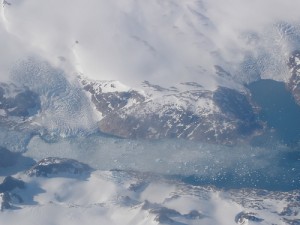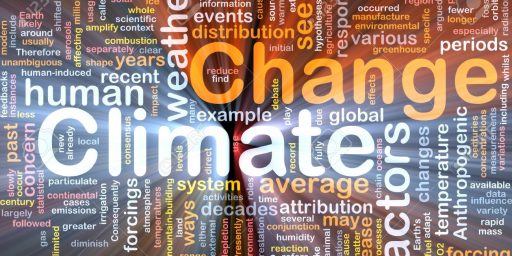Sea Levels Rising Faster Than Predicted

Via Randall Parker, it appears that global sea levels are rising faster than previously predicted.
The global sea level looks set to rise far higher than forecast because of changes in the polar ice-sheets, a team of researchers has suggested.
Scientists at a climate change summit in Copenhagen said earlier UN estimates were too low and that sea levels could rise by a metre or more by 2100.
[…]
The UN’s Intergovernmental Panel on Climate Change (IPCC), in its 2007 Fourth Assessment Report, had said that the maximum rise in sea level would be in the region of 59cm.
Professor Konrad Steffen from the University of Colorado, speaking at a press conference on Tuesday, highlighted new studies into ice loss in Greenland, showing it has accelerated over the last decade.
Professor Steffen, who has studied the Arctic ice for the past 35 years, told me: “I would predict sea level rise by 2100 in the order of one metre; it could be 1.2m or 0.9m.
Yes, yes, I know. Don’t believe the findings of climate scientists. Blah blah blah it’s all a hoax blah blah blah sunspots blah blah blah excuse to raise taxes blah blah blah Newsweek said cooling in the 70s blah blah blah. No doubt it’s true that the oceans increase in acidity is all made up, too. Oh, and oxygen deprived “dead zones” in the water? They’re because of volcanoes. Or something…
Image of Greenland Glacier Melting. Credit: John Kirriemuir





I heard all the climate change deniers were being rounded up into secret FEMA concentration camps.
The serious lesson I’m getting from the financial crisis, and from the slower-moving climate question, is that (a) it is all about prudent decision making in the face of uncertainty, and (b) people aren’t that good at it.
Is it as simple as being better than a yes/no thinker? If you are even 10% convinced, can you make a 10% (of the maximum, proposed, necessary) investment? And maybe someone 60% convinced would spring for more?
Basically the idea that “I’m not convinced, so I won’t do anything” is remarkably common for an idea that is basically madness.
It’s funny. As has been stated many times before, we don’t put on our seatbelts because we are sure we’ll crash, or buy health insurance because we are sure disease will get us. We do it because the uncertain risk is there, and the investment required is commensurate.
Oh, and we don’t say “I won’t put on seatbelts because everyone knows that a totally safe car would cost a trillion dollars.” Or some such made-up number.
I am routinely shocked by this blog. Admitting that maybe 100,000 scientists are right about their field of study?
You call this a conservative blog?
I’m guessing you guys are all RINOs.
Next thing you know you guys’ll be admitting that 100,000 biologists are right about evolution. You liberal Marxists.
The “excuse to raise taxes” argument always struck me as particularly stupid. It’s like a morbidly obese man who has had free junk food his entire life bitching and refusing to go on a diet because he’ll have to pay more for healthier food.
Gee, if this were a topic the left didn’t think was accurate, we’d all be calling you conspiracy theorists.
Doesn’t the ‘faster than predicted’ part give you guys a clue that you really don’t know what you’re talking about?
Alex, what does science say the level of the sea is supposed to be? Is it rising to a point that is normal for the time? What is the average over the eons of time? Are we going into an ice age or coming out of one? Over 1,000 years ago Vikings lived, cultivated, and raised animals on
Greenland. Can not do that today. Must have been warmer. What was the sea level then Alex? Seems they cannot predict weather accurately a year from now. Trends change. All science can say is oops. Tax payers have to pony up for this BS. If you want to pay more for energy, go ahead. I would rather throw the bums out of office. If we do not spend the future money now on dumb stuff like windmills to produce electrical power (if it were profitable, private industry would do it) the people of that time will have the resources to address it.
An argument against conservatism?
Doctor: Your cognitive decline is occurring faster than predicted.
Bithead: Well, nothing to worry about then.
Predictions, predictions, predictions. Have they got any right up to this point?
It’s very easy to spout off with an alarmist prediction and find yourself mentioned in the headlines. Years later when your prediction failed to come true no one notices. That is a common pattern among climate prognosticators. When they actually get something right I might pay attention.
With predictive science you must first establish a track record of accuracy and others must be able to duplicate it. We don’t have that yet so why are we even calling this science? It’s not. It’s classic academic egomania at work. Though instead of merely misleading students these charlatans are attempting to mislead the world. The world is not quite a naive and impressionable as a nineteen year old sophomore.
Look, just read the press release. “Could be”, “looks set to”, qualifiers like this make the statement worthless. I could just as easily say ocean levels could fall. Well, they could. Prove me wrong.
Don’t be an idiot Steve. Of course climate science is a science and does produce testable hypothesis.
The only sad thing about it is that we only get one shot at it, one progression from present to the future. We can’t back up now, and do a better sea level model.
Most importantly, if the GW scientists turn out to be right (proven, in the actual test) 50 years from now, we can’t turn back the clock and buy more electric cars.
So what do you do? I think the answer is clear, to use shades of probability, and not turn yourself into an “all true” or “all false” imbecile. Hand-waving that oceans “could” fall sure sounds like the later.
Maybe this is correct, we shall see. In the meantime, is it fair to believe that you are no longer open to contrary information Alex? Perhaps I have misinterpreted your comment. If so, my apologies. I’m afraid my irony meter has become disfunctional from overuse.
What year should be selected as the baseline sea level so that we can measure all future years from it and estimate the costs to maintain it as a status quo?
Sure, if you believe in ‘volcano monitoring’, which, as all good Republicans know, is a ridiculous waste of money.
Odo, Did I strike a nerve or something? “Idiot”? “Imbecile”? Those are not the words of reasonable, rational discourse. Of course in climate change discussions reasonable and rational are checked at the door while emotions and hyperbole are used. Funny how my small bit of hyperbole regarding climate “science” makes me an idiot.
I believe you are falling prey to the “tipping point” argument when you say we only have one shot at this. That argument in itself exposes the weakness of the general argument in support of AGW. Mann et al was proven to be wrong. There is not likely a tipping point (ignore the Hollywood movies) but if further studies support AGW we can adjust at a reasonable pace. The tipping point argument is a necessary political tool but a weak scientific argument. While you are portraying me as an “all true” or “all false” imbecile isn’t the tipping point reasoning just the same? I see myself as wanting more information and measured responses if needed.
By the way what are those testable hypothesis and how do they work when we have been cooling since 2001?
.
Yet, they are words, and yes, attitudes, that get used regularly whenever the left’s narrative gets challanged.
(A wry look)
Trust me, I know.
Well here’s the thing. There are idiots in the world. Sometimes you can engage them, and if they are temporary idiots, they’ll respond to patience and reason. In that case, civility yields a benefit.
In other cases, you might be meeting a permanent idiot, someone who has his ears stoppered against reason. In that case, you certainly aren’t going to convince him. All you do by engaging in civil discussion is to give him respect he clearly does not deserve.
In that case, you become an enabler.
So, I don’t feel like enabling today, if you want civility and respect, don’t be such an idiot.
I think you have to separate the political and scientific content of this argument.
Al Gore has recently just declared that his “consensus on global warming” of a couple years ago has evolved into “Proven Scientific Fact.” During that period of time, the support of many scientists and general public opinion has eroded.
How do we explain the Medieval warming period, when European explorers went to Greenland and set up settlements and grew crops that longer will grow there. And England had wine vineyards(both in the tenth and eleventh Century); they don’t do those things in either locale now. Because it is too cold.
Then five to six hundreds years later(in the fourteenth and fifteenth century), it was so cold in London, that the River Thames froze over. Ice Fairs were held on the frozen river, and Londerer’s used to ice skate in downtown London. They must have froze their asses’ off.
Since the mini-ice age, we have had several drastic variations of weather, here on earth. If we go back to the medieval warming period, we find that increases and decreases seem to track sunspot activity. The more active on the sun, the warmer the temperature, here on earth.
Go back and check sunspot activity, since humans have been monitoring the activity. You have the Medieval Maximum, the Maunder minimum, the Dalton minimum, and the Modern Day Maximum. It has nothing to do with human activity on earth, CO2 production on the earth rarely heats and cools the SUN.
Recent ice-core drilling in Greenland has revealed that for the last one hundred thousand years, temperature have varied greatly in a very short period of time.
Recent weather global phenomenon or political activity here on earth has revealed that logic is at a minimum and political activity is at a maximum.
by
Don’t get me wrong, I am not firmly convinced that sun spots caused all this, but you can bet your ass, I don’t believe Al Gore can solve it.
I’m reluctant to bring this up, in fear of Alex’s final comment, but wasn’t another prediction that we were going to be having stronger and more frequent hurricanes due to global warming, increased water temperatures, and blah, blah, blah?
Honestly though, exactly what would you expect the experts to say at a climate change summit? Can’t let those crises go to waste now, can we?
Yee Haw…
This crisis has legs.
We have so much time, energy, bad science, and future considerations(government funds) invested here; that we would be fools to go out and work for a living.
“If the facts are on your side, pound on the facts; if the law is on your side, pound on the law. If neither is on your side, pound on the table.”
Calling a man an idiot who asks for examples of predictions that were borne out by subsequent events is table-pounding. Odograph’s unwillingness or inability to simply provide an example doesn’t tell us anything about climate science, but it does tell us a great deal about him. It’s especially humorous when deployed in defense of a post claiming that “Sea Levels rising faster than predicted” when the linked article says no such thing. It claims only that predictions are too low. The only observed data discussed in the linked article indicates a rise of 300 mm in the next 100 years – less than a third of the prediction.
And what process would cause them to fall? GW scientists have defined a process that would cause them to rise, a process that can be measured and tracked. If you can think of some process that would cause sea levels to fall, we can measure and track that too, and see which of your theories is more accurate.
Phil, if you’ve got the science take it to the National Academies, and make your case. Take it to NASA. If you have the science, rule them.
If you don’t have the science, be an idiot in the back threads of a political blog and pretend all you want.
BTW, I think this kind of idiotic insistence that wingers in the back pages of OTB actually have all the science is exactly the table-pounding of which you speak.
I mean look at yourself man! Where are you, and why don’t you even aspire to really making the case in anything other than a friendly little club of political like-thinkers?
I should answer you? At friggin’ OTB? You think that is science, or are you a cretin demanding attention?
No long ago I went to the ocean and saw the level rise…and then it fell and then….it rose again it repeated this process but the frequency fluctuated. I pondered this for a while before I realized I was observing waves.
I freely admit I don’t have the science. But as is becoming increasingly obvious, you don’t either. When there are genuine climate scientists making one set of claims, and another – admittedly smaller – group making a completely different set of claims. There’s only one appropriate mental stance in that case – healthy skepticism.
Again – you don’t have the science. If you did, you’d provide some slight evidence thereof. Right now, the only person acting “like an idiot in the back threads of a political blog” at present is you. You present ad hominem and argument from authority, and nothing else. And every time you pound on the table, you reinforce that perception.
The problem, Eneils, is that our global temperature no longer tracks solar variation like it has in the past several hundred years of recorded data. Yes, our temperature still rises and falls with solar activity, but the average temperature across the cycles has steadily increasing over the last 100 years with a dramatic increase over the last 20 or so.
Well, no, skepticism isn’t not the appropriate stance here. Healthy questioning would be good, but when the majority of those who should know the right answer have one theory, and the minority doesn’t have anything that will disprove that theory, then the appropriate stance is to accept the tested theory until new evidence arises to challenge it, rather than rejecting it in favor of no theory.
Looks like you went a wee bit off the wall there, baby cakes.
I take everyone who comments here as a person driven by principle, not emotions and ideology.
Don’t dislike any of them.
Life is too short, disagreements come and go, hatred and undigested anger that simmers in your gut takes time off your life.
I have always believed that if you take enemy, truly forgive them, it will add time to your life; Kinda like taking your children fishing.
See, this is part of the idiocy, and the astonishing thing is that you don’t see yourselves in action here.
You are asking me, a random pseudonymous commentator, to prove GW to you, or to accept your disproof.
I, Odograph, should not go to the National Academy of Science, and see what they believe. I should not go to NASA, or skip over to the British Royal Society, or the Japanese academies science, or the French, etc. I should not read National Geographic. I should not watch Weather Channel. I should not read Scientific American. All those actually agree.
No you think I should argue it with you here, in a back-thread at OTB.
Why exactly? Why is deciding it here better than deciding it there?
re: Skepticism. I don’t think you and I are disagreeing in kind, Michael, merely in degree. I’m being asked by people who can’t make an argument to make significant lifestyle changes, and economic sacrifices. I think it’s perfectly reasonable to ask for examples of accurate, non-trivial predictions that support the “proven theory”. When none are forthcoming, but instead we’re treated to a string of informal logical fallacies, I grow even more skeptical.
This is the nature of public debate. When I’m being asked to sacrifice for the greater good, I’d like just a little more than “trust the man behind the curtain”.
I disagree with you. It does not track precisely, but the rise and fall of Earth temperatures does seem to generally follow Sun spot activity.
Twenty years of tracking Sun spot activity may not be conclusive…but in the last twenty or thirty years Sun spot has been increasing.
And I am not citing the last twenty years, I am looking at actual observations over the last one thousand years.
One thousand years is a small slice of time, but yours is just a sliver.
Particularly since we now know the nature of the man behind the curtain.
True, But I do keep trying with you anyway, being a nice guy and forever hopeful. I’m not the one shutting off all debate on the issue.
In the meanwhile, perhaps this would interest you?
As for the number rising unexpectedly, are these the same folks who gave us ice readings that were remakrably inaccurate due to ‘sensor malfunctions’? And why is it that when such errors occur, they invariably lend themselves toward the global warming myth?
Comon… you cannot call yourself ‘reasonable’ and ignore these clues any longer.
Odo may be right. Why are we discussing anything here in a back thread? What’s the purpose? Is there a purpose in life?
Odo, discussion is what goes on here. Don’t act shocked when you find it. If you don’t want to participate then don’t.
Of the two of us, you’re the only one making positive claims, Odo. You might profit by asking yourself why you feel compelled to lash out against anyone with the temerity to ask questions.
“Attention-seeking cretin”? You’re projecting.
So am I, I’m pointing out that while global temperature has more or less tracked solar activity for 900 years (something you agree with), it hasn’t in the last 100.
Zelsdorf,
I think you were misinformed on this point. The livestock that was raised in Greenland had to be kept in warm barns 24-7, and the surface of Greenland was still primarily icesheets and permafrost.
It’s not a question of what is the “right” sea level from a geologic perspective, but rather a human perspective. Rising sea levels are going to impact human communities and human economies. Furthermore, that sea levels are rising faster than previously predicted provides further support for climate change theory.
Steve Plunk,
Yes. In fact, the IPCC models fairly closely track the general climate trends we see today.
Charles,
I’m always open to new interpretation, but having studied climate science on the side for many years now, I find that the climate change hypothesis is the best fit for the current available date.
Sea level rise is a side effect of increasing temperatures as a consequence of CO2, CH4, SO2, and H20 gas emissions. It is those emissions that need to decrease.
Eneils,
I’m not sure what you mean by sunspot activity affecting temperature, as sunspot activity rises and falls in roughly 11-year cycles. For your hypothesis to be correct, global temperatures should also rise and fall in roughly 11-year cycles, but this does not appear to be the case.
The cooling of Europe and North America is a predicted result of current climate change models due to the melting of Arcitic ice diluting the gulf stream and lowering its temperature, thus moving less heat from the south to the north.
Charles (again),
On average, yes. There isn’t enough data yet to plot trends on this, though, as our ability to extrapolate backwards is incomplete.
Bithead,
Do you have an actual link to that Japanese report? I could only find press releases which said that out of five scientists, three disagree with the climate change hypothesis. I cannot ascertain whether this report has gone through the normal peer review process. However, it does appear that two vice-presidents of this organization work for Japanese oil, gas, and electricity interests, which calls into question whether there is a conflict of interest. I also cannot tell, from the English website, whether this organization actually promotes original scientific research or indeed, what it does at all.
Alex, with respect to the oceanic areas suffering from hypoxia, are we really sure that they have “doubled every decade since the 1960s” or are we just getting twice as good at finding and reporting on them every decade since the 1960s? How many were there in the 1950s? The 1850s? Are there enough data points to make meaningful definitive statements on this? Did you ever consider that if you aggresively solve the wrong problem you are also “going to risk losing vast sections of its ecosystem”?
Charles,
Well, the hypoxia isn’t actually related to greenhouse gas emissions, so maybe that wasn’t fair to put in. But given that the data currently supports the hypothesis that dead zones are caused by nitrate runoff from fertilizer, the increase in number is to be expected. But yes, you are correct–it may be that we are better at identifying them now.
The original report is in Kanji, Alex.
However, there are translations of key areas, for example, at The Register
And why should these be called into question, if we’re to accept as gospel, the claims of those working for Al Gore and George Soros?
Alex, Having the IPCC predictions closely track is not impressive. How closely? For how long? With temperature spreads of fractions of degrees it would seem easy to “track closely”. How about sea level predictions?
Yes, you are right about the eleven year cycles of sun spots.
But sun spots seem to cycle every eleven years on a much longer sinusoidal wave function lasting hundreds of years measured in radiant energy delivered to the earth, measured in watts per square metre.. That’s how we get the Medieval warming period and the mini ice age, lasting hundreds of years. In the cold periods and in the warm periods, we still have sun spot activity, cycling every eleven years. Sun spots still have some effects on short term climate. There has not been enough time time to collect data on these long cycles while we know something about the eleven year cycle of sun spots.
Steve,
There are several IPCC models with varying assumptions, but some of the intermediate models track temperature within the expected standard deviation.
Eneils,
Do you have some peer reviewed evidence for this? I can’t find this description of a large sunspot cycle anywhere.
The problem with this reference is that both the “Medieval Warming Period” and the “Little Ice Age” were not global events–they were localized to parts of Europe and North America. So even if you use this as evidence of some over-arching sunspot cyle, it’s not an explanation of GLOBAL climate change. We are currently seeing an increase in mean GLOBAL temperatures, and have since the 1850s.
The problem with climate modeling is that there is no way to exhaustively and conclusively test much of any relevant hypothesis in the lab. There is no way to take something like the Earth and scale it down in the lab, and any kind of computer modeling can only look at a few variables at once (hence the inconclusive/ erroneous predictions). Any other predictions are from a limited number of sensors in the world, which only operate about as well as a world modeled in a lab.
There is no argument that CO2 is a greenhouse gas. Why we’re going to quibble over the variances of people’s predictions is beyond me. Even if our Earth is more than capable of absorbing the CO2 and we’re in a natural warming/ cooling cycle WHATEVER, it doesn’t change how the C02 is produced: The destruction of rainforest and the burning of fossil fuels.
Either way is unsustainable. Rainforest doesn’t grow back, and but for the thinking of a very few, oil isn’t constantly being replenished. Y’all can say it’s a tax on stupid, but to me investments on alternatives/ sustainables is the *only* way to guarantee a peaceful, prosperous, and healthy future.
Are you sure about this, or is it just that we have more data from these periods for parts of Europe and North America than most of the rest of the globe? Any idea how much ice there was in Antarctica during these “non-global” events to test your hypothesis?
I don’t think this statement is defensible. I heard the same thing about Yellowstone National Park after the big fires there in 1988, where the intense heat supposedly destroyed the soil and it would be at least 500 years before the forests would return. I was there 10 years later and it clearly was recovering quite nicely and much, much faster than anyone had predicted. Nature is much stronger than you imagine.
Gentlemen:
from my earlier comment,
There has not been enough time to collect data on these long cycles while we know something about the eleven year cycle of sun spots.
I am as clueless as you are..
Well, look, just for laughs, let’s take the discussion out of the oceans and put it into the frame of a somewhat better controlled and thereby more measurable environment; Lake Erie.
Check this article on the connection between sunspots and the lake levels on Lake Erie. Among other issues, it brushes up against your question of the long cycles, Alex.
http://adsabs.harvard.edu/full/1933PA…..41..198N
But if I compare sunspot activity to my pool level, it proves that there is no connection between solar activity and water levels. My anecdote carries as much weight as yours.
Read the full article at http://www.americanthinker.com
Your spam filter prevents me from posting the ICCC website URL, so it is easily found by Googling ICCC.
(Hmmmmm) An interesting notion.
We know for example that the Great Lakes are affected in their levels and currents by the moon in it’s orbit as is the ocean… so the ability to be affected by external forces would appear to be in play for the lakes.
I wonder if the same can be said for a swimming pool? I’ve not heard of such an experiment. The measurements would be far smaller of course and possibly harder to track in the pool than in the natural body, owing to size, of course. I would think the pool’s evap rates would be somewhat higher, given salinity and temp factors.
The reason I bring up the lake thing, though is that it far easier to measure with any acuracy… this woud seem a major consideration, given the recently noticed errors on the measurement of ice at the poles… an error which once zeroed out, completely disproved the notion that our ice caps are melting at record rates… turns out they are in fact growing.
You fail science. Any body of water, or any body of anything for that matter, is effected by the moon’s gravity.
And also not indicative of global activity as a whole, which my anecdote points out.